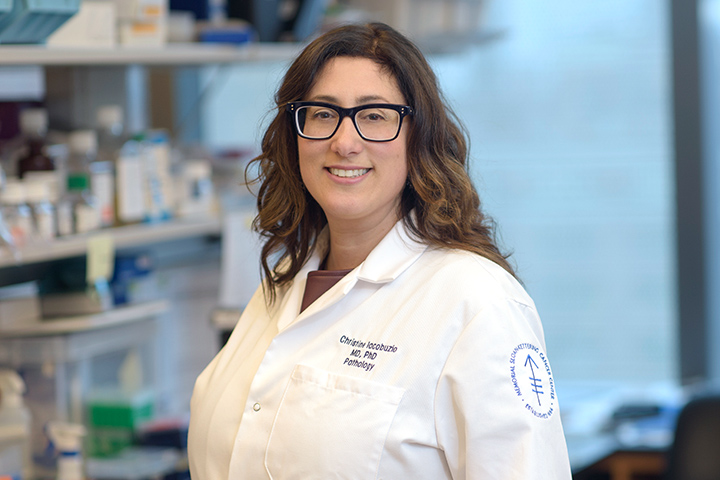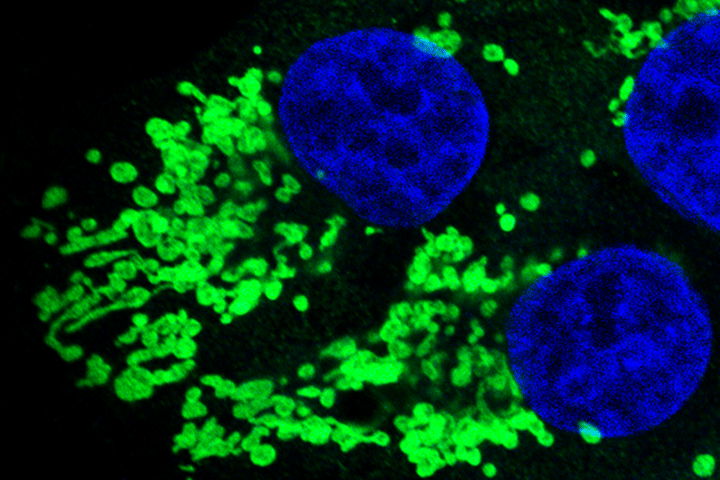Using Tumor Tissue Samples to Break Down Assumptions About Pancreatic Cancer

Physician-scientist Dr. Christine Iacobuzio-Donahue has made good come from tragedy.
She was just 10 years old when her dad died of metastatic colon cancer, six months after he received his diagnosis. “I was always aware of metastases since I was young, even before I really knew what it was,” she says. “I couldn’t imagine the concept of a patient being given a terminal diagnosis, and I knew I wanted to study this thing called metastasis. I wanted to find answers to advanced cancer so people could live longer, so they could survive.”
It’s a lofty goal, but one she is well-primed to study. As Director of the David M. Rubenstein Center for Pancreatic Cancer Research at Memorial Sloan Kettering Cancer Center (MSKCC), in New York, Iacobuzio-Donahue is researching the evolutionary mechanisms of cancer, specifically pancreatic cancer. And when she is not in her lab, conducting research with her team, or presenting at or helping to chair various conferences, you can find her leading MSKCC’s Last Wish Program, which allows people to donate their tumor tissues after they die. It’s similar to a program she helped develop during her tenure at Johns Hopkins.
Iacobuzio-Donahue has hundreds of peer-reviewed publications, numerous grants, and numerous awards. In 2019, she added to her awards by being named recipient of the Ruth Leff Siegel Award, presented by the Siegel family and the Pancreas Center of Columbia University Irving Medical Center, New York. The Center has been entrusted by the Siegel family to identify the investigator, or team of investigators, who has had the most impactful contribution to the understanding, treatment, and advancement of pancreatic cancer over the past year. The members of the Ruth Leff Siegel Award committee select an awardee outside of Columbia who will receive a $50,000 cash prize. A second award of $25,000 will recognize a faculty member within Columbia. This year’s Columbia award winner is Andrea Califano, Dr., the Clyde and Helen Wu Professor of Chemical and Systems Biology.
“I have to say I’m really excited about this and I’m really looking forward to it,” Iacobuzio-Donahue says. “I remember being told early on that pancreatic cancer is a waste of my time and effort because there’s nothing that can be done. But the truth is you can’t do anything if you don’t put in the effort. I just want to jump in and do what is most important and most helpful. And I don’t and will never believe pancreatic cancer is automatically a death sentence. We can get to answers.”
Finding Those Answers
In trying to find those answers, Iacobuzio-Donahue and her team rely on the rapid research autopsy. The idea behind the rapid research autopsy protocols in pancreatic and other cancers is to obtain tissues from cancers quickly after death, before those tissues start to degrade, she explains. Then, using sophisticated gene technologies, “we can try to figure out just how pancreatic cancer survives,” she says. “This is a disease that manages to survive every single drug that’s thrown at it, and the tissues have the answers. But it has to be said that we can’t find those answers without the incredible altruism shown by patients and their families. Patients want to help find a cure for pancreatic cancer even if that treatment can’t help them.”
Rapid autopsy programs have many benefits for researchers. These programs allow researchers to analyze tumors they couldn’t access while a patient is alive, help answer fundamental questions about why some patients respond to treatment while others don’t, and why treatments eventually stop working for many patients. But for Iacobuzio-Donahue, one of the most important aspects of the research autopsy is that it can help explain metastases, the deadly march of cancer cells spreading throughout the body. “No matter how you look at it cancer is a disease of evolution,” she explains. “When we study the tissues post-mortem we can learn how metastases are different, most importantly how tumors that have spread are different from the tumor where the cancer started. By learning how they are different treatment can be more precise.”
In a paper published in September 2019 in the journal Nature, called “Cancer Biology As Revealed by the Research Autopsy,” she and her colleagues make a strong case as to how the research autopsy provides the best means to allow multi-regional sampling of a cancer that isn’t possible in traditional resections or biopsies in living patients. And although the rapid research autopsy may not seem like a topic that engenders excitement, the opposite is true. Iacobuzio-Donahue’s work is significantly cited and fellow researchers are quick to point out that they couldn’t conduct their own studies without the tissue and research provided by labs like hers. And if social media is any indication, Iacobuzio-Donahue’s presentation at the 2019 AACR pancreatic cancer conference on “Multimodal evolutionary dynamics of pancreatic cancer,” along with her Nature review article, were met with rave reviews. “I’m really happy about that because some images in my PowerPoint presentation kind of screwed up,” she laughs.
Breaking Down Assumptions
The bulk of Iacobuzio-Donahue’s work is “to break down assumptions” about pancreatic cancer, she says. Some of her and her colleagues’ findings of which she is most proud upend the conventional wisdom that pancreatic cancer is so lethal because it spreads so quickly.
Rather, they found that it takes at least a decade from when pancreatic cancer first forms for it to become deadly. The team analyzed tissue samples taken post-mortem from patients with pancreatic cancer. They identified what are called “distinct subclones” of malignant cells present in the primary tumor before those cells spread to other body organs. A distinct subclone refers to the heterogeneity of tumors—pancreas tumors can be made up of many subpopulations of cells, each of which is characterized by a unique profile of gene variants. Simply, when pancreatic cancer spreads to any organ, such as the liver or the lungs, those tumors are different than the tumor that started it all in the pancreas. By using a special algorithm, the team estimated the length of time to metastases. “For patients, what that really means is there is the opportunity for early detection, and prevention,” she notes.
Because of this tumor heterogeneity, conventional wisdom also assumed so-called driver mutations (mutations that promote growth and spread) were different. But Iacobuzio-Donahue and colleagues from Johns Hopkins and other sites found that it’s actually the same mutations that are involved in driving both the primary tumor and the spread of the tumor. “What this means is that targeted treatments in metastatic disease could potentially work on the primary tumor and the tumors that have spread,” she says. She adds that they used tumor sequencing data on patients who never received treatment. Therefore, the multi-site team could study and gain unique insights on the natural course of pancreatic cancer since chemotherapy and radiation therapy alter cancer behavior.
In a related study, the researchers also found that metastatic tumors had additional epigenetic changes that could potentially be amenable to another treatment. Epigenetic changes are those DNA changes that can turn genes both “on” and “off.” They don’t actually change the DNA sequence. Drugs targeting these epigenetic changes are now being studied in cancer treatment.
“Biology influences everything after the diagnosis,” says Iacobuzio-Donahue. “I think sometimes in science collectively we are making things more complicated than they need to be.”
And like other physician-scientists, she is hopeful. “I really think the advances in pancreatic cancer are happening so quickly that I have to believe in my heart and my gut that if science doesn’t cure it, we will absolutely be able to provide long- term survival for patients.
“It’s a bad disease. But it’s got an Achilles heel. I’m really proud to be part of a group of people who are determined to find that Achilles heel.”






